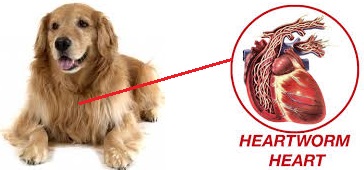
A heartworm in dogs is a parasitic worm that is very common both in dogs and in cats. As the name suggests, heartworms live in your Golden Retriever dog's heart and are generally found free-floating in the blood vessels that surround the heart and in the right ventricle. Heartworms in dogs are transmitted from dog to dog by mosquitoes, which pass the larvae through their saliva into the dog. Heartworms can be very dangerous and even fatal to your Golden Retriever dog or puppy. It is difficult to detect the heartworm symptoms, as your Golden Retriever dog will show no signs of infection until the disease has progressed considerably.
Heartworms in dogs: What are the Heartworm symptoms?
Once infected with heartworms, your Golden Retriever dog or puppy will show no heartworm symptoms or obvious signs of infection and the heartworms in dogs will not be detectable with a blood test. Once the larvae reach the maturity and infect the heart, a routine X-ray will confirm their presence almost immediately. Damage to the blood vessels surrounding the heart and lungs will be apparent and the heartworms will continue to grow and multiply until the flow of blood is blocked and the dog will exhibit other heartworm symptoms such as pain, hypertension, fainting, breathing difficulties, and lethargy. Advanced heartworm infections in dogs will eventually lead to heart failure and death, although by this time the Golden Retriever dog's owner will have noticed that something is wrong and will have sought medical care or heartworm treatment for the dog.
Heartworms in dogs: Which Heartworm treatment can you use?
Once a dog has been diagnosed with those parasites, heartworm treatment must begin immediately. There are four stages for heartworm treatment:
Stage one is when your Golden Retriever dog or puppy is at the lowest risk for permanent health issues. Heartworms in dogs will appear in X-rays but there will be no other obvious signals.
Stage two indicates a moderate infection and your Golden Retriever dog or puppy may have trouble breathing and/or have severe coughing.
Stage three includes a severe infection of heartworms in dogs and your Golden Retriever puppy or dog may lose weight, have an extremely hard time breathing, and blood tests will show liver and/or kidney damage.
Stage four generally includes Vena Cava Syndrome and your Golden Retriever dog may be in shock, essentially dying slowly. During this stage surgery is the only method of removing the heartworms in your dog and there is no guarantee that this will save the dog's life.
Heartworms in dogs: Prevention is better than treatment
Prevention is the best medicine to ensure that your Golden Retriever dog does not become infected with heartworms. Preventative measures should be taken from the time your Golden Retriever dog is a puppy, before he reaches seven months of age. Older dogs are at greater risk for negative reactions and resistance to preventative treatments of heartworms.
[AdSense-A]
Popular articles about golden retrievers :
==> My Dog Ate Chocolate. What Must I do?.
==> Can Dogs Eat Grapes or raisins? | Dog & Grapes Toxicity.
==> Tramadol for dogs : Risks & Toxicity.
==> Deworming Golden Retriever Puppies : The Safe Way.
==> Urinary Tract Infection UTI : Symptoms, Causes & Treatement.
==> Best Female & Male Golden Retriever Dog Names for 2016.
More information about Worms in Golden Retriever Dogs or Puppies and Heartworms in dogs